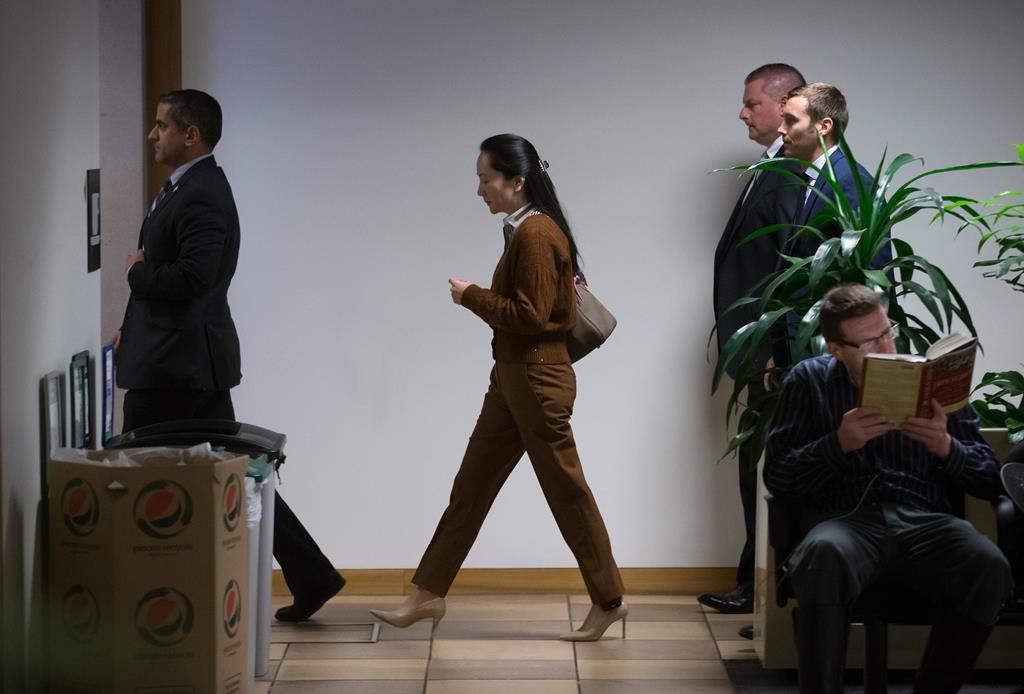A B.C. Supreme Court judge has ordered the Attorney General of Canada to turn over a new batch of documents related to the extradition of Chinese tech executive Meng Wanzhou, ahead of her trial on extradition to the United States.

Meng was arrested at Vancouver International Airport on Dec. 1, 2018 on an extradition warrant. U.S. officials allege she violated sanctions against Iran.
Meng, who is the chief financial officer (CFO) of tech giant Huawei, alleges that Canadian officials unlawfully detained her, colluded with U.S. authorities and violated her Charter rights.
In the ruling, published Tuesday, Justice Heather Holmes ordered Canadian officials to turn over a wide range of documents relating to Meng’s arrest from the Canada Border Services Agency (CBSA), RCMP and Department of Justice.

Holmes ruled that Meng’s team had met the legal test of establishing an “air of reality” around her claims of abuse of process, though noted the test had a low threshold.
“The order I will make does not predict or imply that Ms. Meng’s claim of abuse of process will ultimately succeed,” wrote Holmes.
Meng’s claim of abuse of process hinges on her argument that police should have arrested her immediately upon her arrival in Canada, before she even exited her plane.

Get breaking National news
She alleges that Canadian officials changed their plan at the last minute to have her go through CBSA screening instead, with border agents improperly using their powers to search and question her, then pass that information on to U.S. law enforcement.

Canada rejects those allegations, arguing that processing Meng through immigration channels was proper, particularly given criminal and national security allegations against her from the U.S., and that border guards, though peace officers, do not have the power of arrest regarding extradition matters.
The Attorney General also argued that Canadian officials neither planned to nor did they give secret help to U.S. authorities, and that the only help the CBSA gave to the RCMP was when it gave passcodes for Meng’s mobile devices to officers as a “mistake.”
Holmes found both sides in the case largely agreed on the facts that had been presented, though drew competing inferences from gaps in the evidence.

“I view the evidence tendered by the Attorney General to address those gaps as strategic in its character yet impoverished in its substance,” wrote Holmes.
“For example, largely unexplained by responsive evidence tendered by the Attorney General is why the CBSA made what is described as the simple error of turning over to the RCMP, contrary to law, the passcodes CBSA officers had required Ms. Meng to produce, and when and how the mistake came to light.”
Tuesday’s order is the latest skirmish in a months-long pre-trial legal battle between Meng and Canadian authorities.
Her trial is slated to begin on Jan. 20, 2020. Meng remains on bail and under partial house arrest in Vancouver.
The ruling comes one year after Canadian diplomat Michael Kovrig was detained in China.
The detention of Kovrig and a second Canadian, Michael Spavor, are widely believed to be retaliation for Meng’s arrest, and has become a potent symbol the deterioration in diplomatic relations between Canada and China amid the extradition dispute.
On Tuesday, China hinted at upcoming trials for the two men on vague national security charges, in what has been characterized as an attempt to pressure Canada to release Meng.
- B.C. First Nation opposes cull on its territory after footage of ‘Judas’ wolf
- Father of Tumbler Ridge school shooter issues statement: ‘I carry a sorrow’
- ‘We now have to figure out how to live life without her’: Mother of Tumbler Ridge shooting victim speaks
- They ‘ran into gunfire’: Impact of the Tumbler Ridge shooting on first responders








Comments
Want to discuss? Please read our Commenting Policy first.